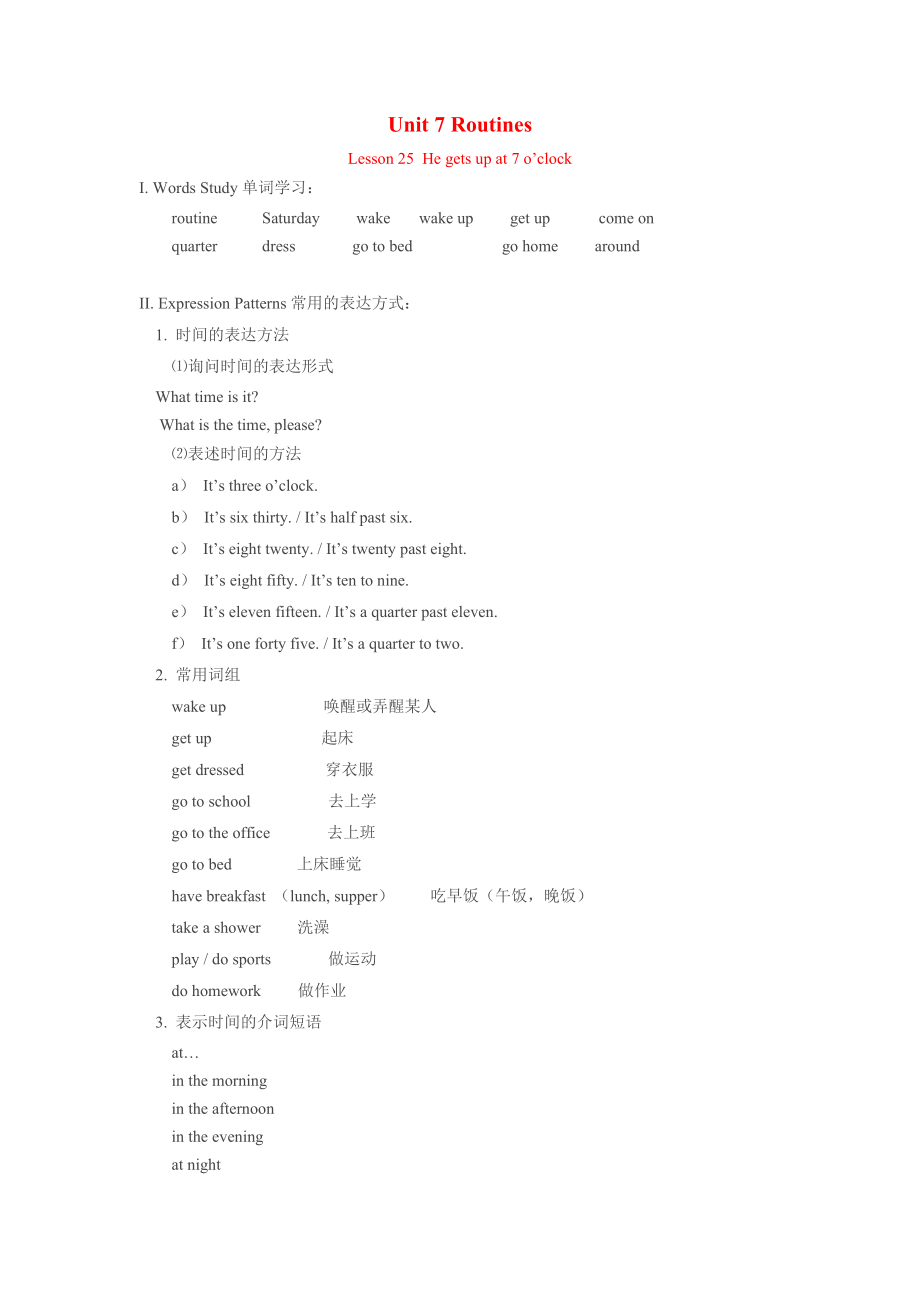《七年級(jí)英語(yǔ)下:Unit 7 Routines esson 25 and esson 26重難點(diǎn)解析北師大版》由會(huì)員分享��,可在線(xiàn)閱讀����,更多相關(guān)《七年級(jí)英語(yǔ)下:Unit 7 Routines esson 25 and esson 26重難點(diǎn)解析北師大版(2頁(yè)珍藏版)》請(qǐng)?jiān)谘b配圖網(wǎng)上搜索。
1���、此資料由網(wǎng)絡(luò)收集而來(lái)���,如有侵權(quán)請(qǐng)告知上傳者立即刪除。資料共分享��,我們負(fù)責(zé)傳遞知識(shí)���。
Unit 7 Routines
Lesson 25??He gets up at 7 o’clock
I. Words Study單詞學(xué)習(xí):
routine?????????? Saturday???????? wake?????? wake up???????? get up??????????? come on
quarter?????????? dress????????????? go to bed????????????????????? go home???????? around
?
2�����、
II. Expression Patterns常用的表達(dá)方式:
1. 時(shí)間的表達(dá)方法
⑴詢(xún)問(wèn)時(shí)間的表達(dá)形式
??? What time is it?
???? What is the time, please?
⑵表述時(shí)間的方法
a) It’s three o’clock.
b) It’s six thirty. / It’s half past six.
c) It’s eight twenty. / It’s twenty past eight.
d) It’s eight fifty. / It’s ten to nine.
e) It’s eleven fifte
3���、en. / It’s a quarter past eleven.
f) It’s one forty five. / It’s a quarter to two.
2. 常用詞組
wake up?????????????????????? 喚醒或弄醒某人
get up????????????????????????? 起床
get dressed?????????????????? 穿衣服
go to school????????????????? 去上學(xué)
go to the office????? ?????? 去上班
go to bed?????????????? 上床睡
4、覺(jué)
have breakfast (lunch, supper)??????? 吃早飯(午飯�����,晚飯)
take a shower??????? 洗澡
play / do sports???????????? 做運(yùn)動(dòng)
do homework??????? 做作業(yè)
3. 表示時(shí)間的介詞短語(yǔ)
at…
in the morning
in the afternoon
in the evening
at night
on weekends
4. What time do you get up?? I get up at six.? 你幾點(diǎn)起床����?我6點(diǎn)起床。
?
Lesson 2
5���、6??He always goes to work early
I. Words Study單詞學(xué)習(xí):
photographer???????? magazine??????? busy????????????? early????????????? meeting????????? studio
often???????????????????? photograph???? take pictures????????? sometimes????? never
proud??????????????????? seldom?????????? bicycle????????????
6���、????? by????????????????? on foot
?
II. Expression Patterns常用的表達(dá)方式:
1. 表示頻率的副詞
always
usually
often
sometimes
seldom
never
? 2. 表示交通方式的詞組
by bus
by car
by train
by bicycle / bike
by plane / air
by ship /boat
on foot
3. He likes doing everything by himself.? 他喜歡自己做所有的事情。
by oneself 單獨(dú)��,獨(dú)自
She learns English by herself.
They solves the problem by themselves.
 七年級(jí)英語(yǔ)下:Unit 7 Routines esson 25 and esson 26重難點(diǎn)解析北師大版
七年級(jí)英語(yǔ)下:Unit 7 Routines esson 25 and esson 26重難點(diǎn)解析北師大版

